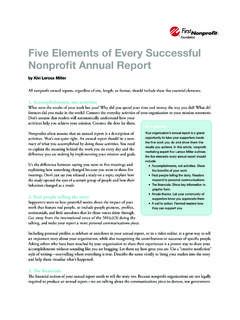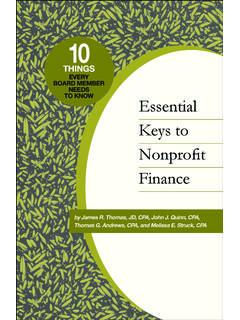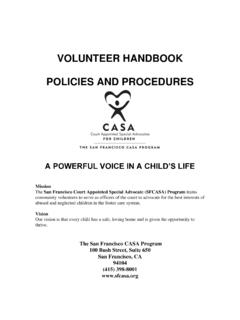Transcription of EVERY BOARD MEMBER NEEDS TO KNOW Volunteers
1 10 THINGSEVERYBOARD MEMBERNEEDSTO KNOWby Pam BetzVolunteersThe Heart and Soulof Your NonprofitMissionOur mission is to foster effective risk management practices and the overall development andadvancement of nonprofits through unique, creative Things series for nonprofit boardsWelcome to this series of short briefing papers for BOARD members of nonprofit series was developed to help both seasoned and beginning BOARD members improve their skills at steering, supporting, and safeguarding nonprofit organizations. Through this series, First Nonprofit Foundation seeks to stimulate BOARD discussions on topics essential to quality governance.
2 Other booklets in this series include the following: A Winning BOARD : Steps That Bring Out the BestAdvancing Together: The Role of the Nonprofit BOARD in Successful Strategic AlliancesChampions with a Cause: The Nonprofit BOARD MEMBER s Role in Marketing Essential Keys to Nonprofit FinanceEvaluating the Executive Director: Your Role as a BOARD MemberFinding the Opportunity in Economic ChaosFundraising: A Partnership between BOARD and StaffRisk Management: Your Role as a BOARD MemberShaping the Future: The BOARD MEMBER s Role in Nonprofit Strategic PlanningStrong Partners: Building an Excellent Working Relationship between the Nonprofit Boardand its Chief Executive Sustaining Great Leadership: Succession Planning for Nonprofit OrganizationsCopyright 2012 by First Nonprofit Foundation.
3 All rights reserved. No part of this work may be reproduced without the prior written permission of First Nonprofit Foundation, except for the inclusion of briefquotations in a review. For more information, please contact:First Nonprofit Foundation1 South Wacker Drive, Suite 2380 Chicago, Illinois 60606 Phone: 800-526-4352 Fax: Volunteers are the only human beings on the face of the earth who reflect this nation s compassion, unselfish caring, patience, and just plain loving one another. Erma BombeckVolunteerism is the heart and soul of the nonprofit sector. Indeed, many nonprofit BOARD members are themselves Volunteers . The organization that manages its volunteer resources wisely has real advantages.
4 It can continue to attract generous people to its cause. It can expand its reach and use its paid staff more efficiently. It can weave itself more deeply into the communities it serves. It can more readily identify new donors, open doors, gain crucial legislative support, and affect the lives of its following ten tips will help your BOARD as it seeks to make the organization a great place to volunteer :1. Craft a volunteer philosophy statement2. Include a volunteer goal in the organization s management plans 3. Measure the impact of the volunteer program 4. Fund effective volunteer management 5. Staff the volunteer program 6. Embrace Volunteers in your risk management7.
5 Create a culture of positive volunteer -staff relations 8. Make volunteer recognition an ongoing and consistent practice9. Engage Volunteers to help market, advocate, and fundraise 10. Remember that Volunteers are potential donors and door-openers12 Craft a volunteer philosophy nonprofit BOARD defines the organization s mission and guides the direction ofthe organization. Many, if not most, nonprofits rely on Volunteers to bring programs and services to life and to serve on the BOARD . For most nonprofits, a volunteer philosophy statement is a basic building block in a volunteer program. It should be developed by the BOARD . The statement articulates the nonprofit s commitment to Volunteers .
6 Here is a sample statement: Our agency encourages the teamwork of employees and Volunteers so that we can offer our consumers the best services possible. Volunteers contribute their unique talents, skills, and knowledge of our community to provide personalized attention to clients, enable the paid staff to concentrate on the work for which they were trained, and educate the public about our organization and its crafting the statement, BOARD members should keep in mind that the standards that apply to Volunteers also apply to BOARD members . A good philosophy statement is grounded in the organization s mission. The philosophy should aim big, as an expression of the organization s hopes, vision, and treatmentof people.
7 For example, if your intention is to involve Volunteers as an expression of your goal of broad participation of constituents and community members , state this. Explain the BOARD s view that Volunteers are a significant organizational asset and express your commitment to attracting and engaging skilled Volunteers . A volunteer philosophy is also the ethical compass that charts the engagement of Volunteers and the organization s accountability to the community at large. This philosophy statement should not be taken lightly, as it is an intrinsic commitment to your Volunteers . That commitment may include financing volunteer activities, managing and training Volunteers , protecting them, and recognizing them appro-priately for their contribution of time and statement does not need to be complex.
8 The BOARD s role is to set broad policy while the staff implements it. The staff may be responsible for developing more spe-cific guidelines to include in a volunteer manual , while the BOARD sets a philosophy to guide the goals, development, and appropriate review of such a engage in nonprofit organizations in multiple capacities, including BOARD leadership, service delivery, fund development, and much more. Volunteers should have the same commitment to the organization s mission and values statement as1. Craft a volunteer philosophy statement32. Include a volunteer goal in the organization s management plansHaving a philosophy statement regarding Volunteers for your organization is the first step in the effective use of Volunteers .
9 The path from philosophy to implementation is best traveled through your organization s planning methods. Typically, these are the organization s strategic and operational plans, which are expressed in its annual plans set the organization s long-term broad goals for accomplishing its mission, while operational plans express those strategies in measureable goals and objectives. The annual budget explains how financial resources will be allocated toward those goals and objectives. There are as many approaches to this process as there are nonprofits, but one thing is certain: if you use Volunteers , your strategic, business, budget, and other major planning processes should include goals for those Volunteers .
10 Include a volunteer goal in the organization s management staff. Regardless of how Volunteers choose to serve your organization, they should be respected and protected. Volunteers help connect the organization to the community and connect the community to the organization. They are the eyes, ears, and mouth of the organization. Volunteers lend credibility, build trust, and attract resources and contributions. Philosophy statements are general, but they are usually followed by policies that express why Volunteers are engaged by an organization; what roles they play; what work they may (and may not) do; what standards govern them; how they are recruited, managed, evaluated, and recognized; the conditions under which they may be terminated; the training, if any, they may receive; their rights; and their (In organizations where Volunteers may be in contact with vulnerable children or adults, additional policies should be written to protect the vulnerable individuals as well as the Volunteers , staff, and organization as a whole.)















